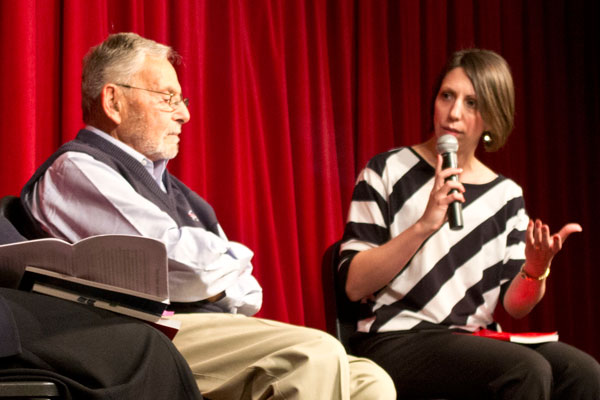Keeping His Story Alive
Naz alum preserves a Holocaust survivor's experience
Sarah Cudzilo Spoto '00 first heard Holocaust survivor Henry Silberstern speak in 1999, in a Nazareth religious studies course about the religious and ethical questions raised by the Holocaust. She was struck by the gentle, dignified man's description of surviving near-starvation, bitter cold, and hard labor at concentration camps as a teenager after the Nazis occupied his native Czechoslovakia.
In 2000, she was able to stand where the brutal treatment occurred, on the first of what has become an every-two-years Holocaust education trip to Germany and Poland called The March: Bearing Witness to Hope. Encouraged to do more after her return, Spoto asked Silberstern if he wanted to write a book.
The two began meeting on Saturdays in 2008 and recorded interviews for 18 months. Spoto pulled together a first draft, and they compiled photographs, documents, and even a patch he had worn in a concentration camp.
"Holding this patch in my hand was the most remarkable moment of my experience with Henry," Spoto writes in a preface to the memoir. "For me, taping Henry's memories, scanning his photos, and writing a draft of his book was my attempt to provide an invaluable resource for educators, students, and general readers. Hopefully his book will inspire others in our community to listen, remember, and record the past of people who have important histories."
Spoto moved to South Carolina, where she teaches middle school. She plans to help other educators incorporate Silberstern's memoir into their curricula. In April, she returned to Nazareth College to be part of a talk and book signing for the memoir, Lost Childhood (JCC Rochester, 2013).
Silberstern told the audience of his initial hesitation to create a book. But, the now 84-year-old added, "My four grandchildren said you have to write something down, for us."
Michael Dobkowski, religious studies professor from Hobart and William Smith Colleges and its coordinator for The March, was in the audience at Nazareth College to hear Silberstern.
"We know the Holocaust is an example of the negative power of words," said Dobkowski, adding that Silberstern's book counters that. "This is the positive power of words."
Spoto said in an interview that she hasn’t been able to find any Holocaust survivors in her new community to speak to students. But she's gained a reputation for her own knowledge. She was asked to speak at an event around the opening of an Anne Frank traveling exhibit, an opportunity to further share the Holocaust story.
"It brought tears to my eyes," says Spoto. "It's now our charge [to tell the story]."

Sarah Cudzilo Spoto '00 and Henry Silberstern at the book launch discussion for Lost Childhood (2013) at Nazareth on April 6, 2014.